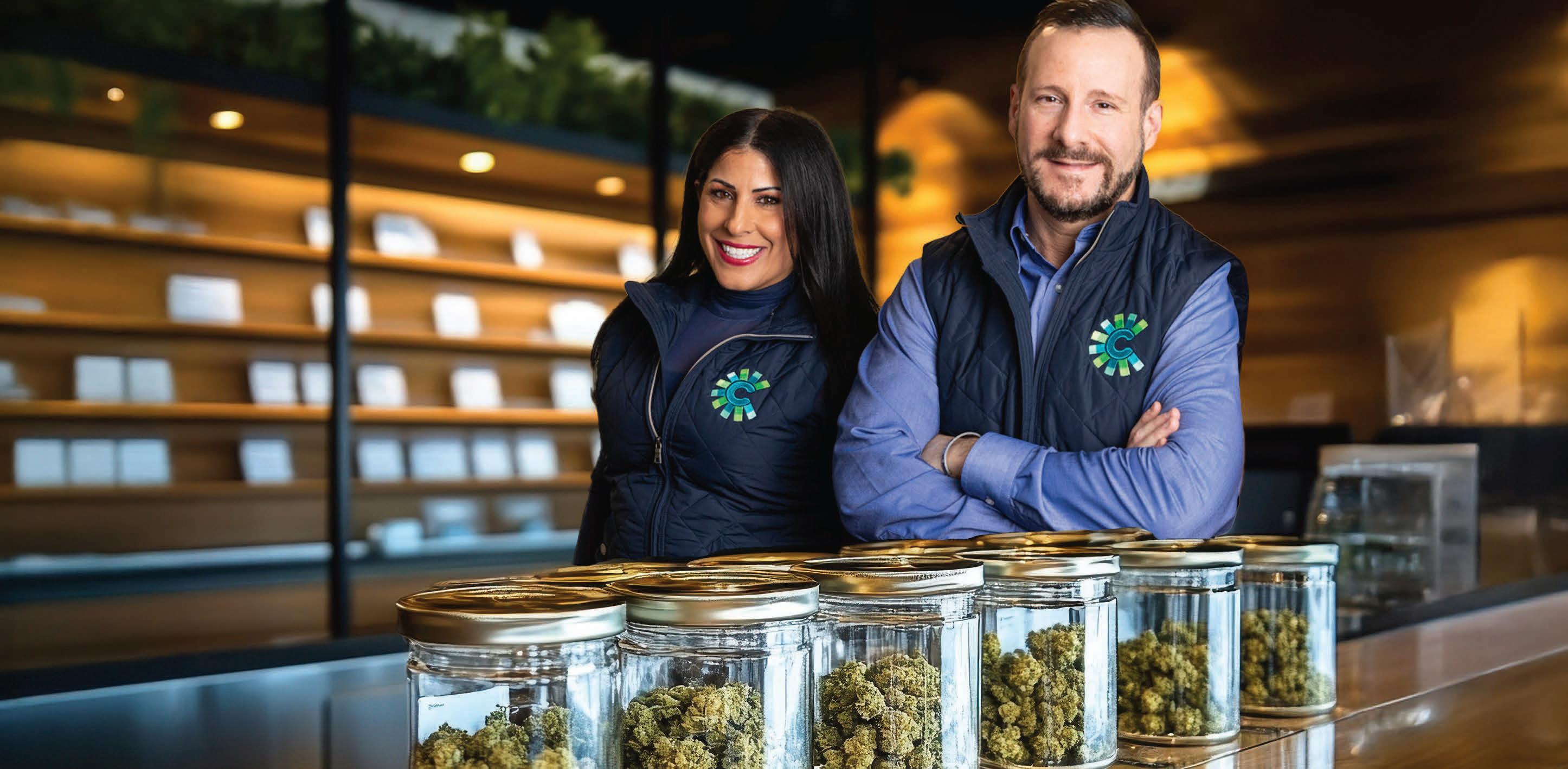OFFICIAL TRADE JOURNAL OF THE MICHIGAN CANNABIS INDUSTRY ASSOCIATION


OFFICIAL TRADE JOURNAL OF THE MICHIGAN CANNABIS INDUSTRY ASSOCIATION

Built on genetics-first growing, Endo is making a name for itself in the crowded cannabis industry















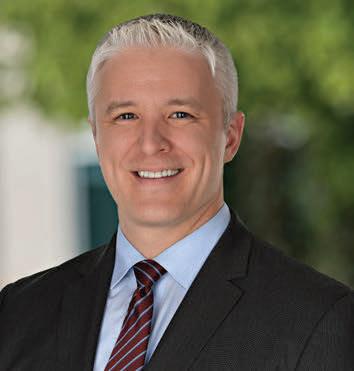



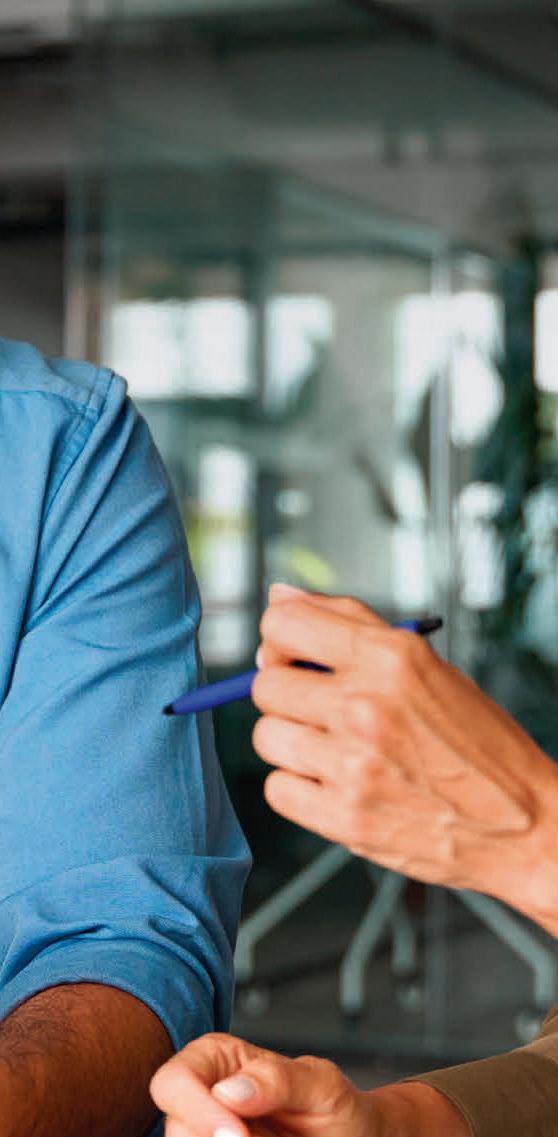




Thomas O’Sullivan, CPA, CFE

We remove obstacles so you can unleash potential.
Strict regulations. Tax implications. Security procedures. Surging competition. It all requires a trusted partner with wide capabilities and a personal, customized approach. Our Cannabis Services Group brings a wealth of experience in cannabis, agribusiness, manufacturing and retail, making us uniquely qualified to help you navigate the complexities. Let us help you thrive.
AUDIT







Business leaders in the cannabis industry say they trust the attorneys of Plunkett Cooney to help them secure and renew licenses, anticipate legal pitfalls and win in court. Grow your cannabis business with confidence. Get the Plunkett Cooney perspective.
n Business Transactions & Planning n Cannabis Law n Commercial Litigation
n Employment Law n Environmental & Energy Law n Government Relations
n License Applications & Renewals n Mergers & Acquisitions n Real Estate Transactions
n Regulatory Compliance n Trust & Estate Planning n Tax Law
ATTORNEYS & COUNSELORS ORNEYS AT LAW
J Jeffreffrey M. Sc y Schroder
Direct: (248) 594-2796
jschroder@plunkettcooney.com






















Wensdy Von Buskirk
Despite
Becky Kalajian






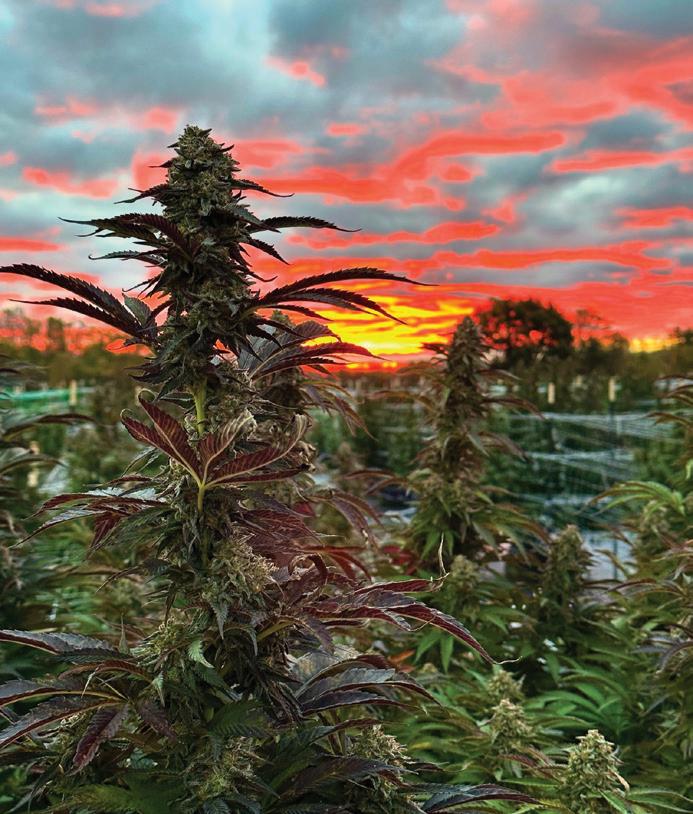

This
Lance Boldrey and John Fraser





216 N. Chestnut St. Lansing, MI 48933 micia.org

Aits members. That’s truer than ever in challenging times and industry-defining moments such as these. Though all of us at the MiCIA were dismayed when — despite our best efforts — the 24% wholesale tax on cannabis was passed by the state Legislature and signed into law this October, we immediately jumped into action to protect our members.
As the leading voice for Michigan’s legal cannabis businesses, we filed a lawsuit challenging the new law on the grounds that it unconstitutionally amends the 2018 ballot proposal Michigan residents overwhelmingly voted to approve. We will do everything in our power to ensure that the legal industry thrives and cannabis businesses are treated fairly.
another way to set your business up for success.
Through Baker College’s online cannabis courses, employees can earn certifications in a variety of areas, ensuring they have the knowledge and skills the industry requires. Turn to page 35 to learn more about the programs.

While we advocate for you in Lansing, we’re also providing helpful insights and strategies to weather these tough times within these pages. Navigating insurance can be tricky for any business owner, and particularly so in the cannabis industry. On page 32, Amanda Kugler of The Roots cannabis insurance agency shares eight tips for making sure you’re fully covered. Investing in employees’ education can be
Thank you for your
support as we work to improve the cannabis industry in our state and help our members flourish.
Proprietary genetics are also a prime way to stand out. Licensees who own their genetics offer unique products that can’t be replicated and reduce their dependence on clone suppliers. For examples of Michigan businesses that are taking this approach, read the feature on page 18. Genetics is also a focus in our cover story, which features Endo Life Inc., a vertically integrated cannabis operator producing high-potency strains while remaining centered on social equity. Read more about Endo’s rapid rise, led by founder Don Lofton, on page 12.
And in the unfortunate event that you decide to close up shop, you may be assessing your options for next steps. Attorneys Lance Boldrey and John Fraser of Dykema write about alternatives to bankruptcy available to cannabis companies — namely, an assignment for the benefit of creditors. Their expert insight (on page 30) can help you navigate a difficult situation.
I hope you find this issue of MiCIA Magazine both helpful and enlightening. Thank you for your support as we work to improve the cannabis industry in our state and help our members flourish. We’re here for you, today and every day.
FOLLOW US AND LIKE US
MiCIA STAFF
ROBIN SCHNEIDER Executive Director robin@micia.org
KENZIE TERPSTRA Membership Coordinator kenzie@micia.org
MICHAEL J. PATTWELL Corporation Legal Counsel mpattwell@clarkhill.com
KEVIN A. MCKINNEY Lobbyist kevin@mckinneyandassociates.net For membership inquiries, email info@micia.org
PUBLISHING PARTNER
GENERAL MANAGER
Ed Peabody
MANAGING EDITOR
Emily Doran
SPECIAL PROJECTS EDITOR Olivia Sedlacek
ART DIRECTOR
Mike Wagester
PRODUCTION MANAGER
Crystal Nelson
SENIOR PRODUCTION ARTIST
Stephanie Daniel
PRODUCTION ASSISTANT
Alessandra Taranta
ADVERTISING ACCOUNT EXECUTIVES
Cynthia Barnhart, Karli Brown, Donna Kassab, Mary Pantely
CONTRIBUTORS
Lance Boldrey, Patrick Dunn, John Fraser, Paris Giles, Becky Kalajian, Kevin A. McKinney, Kenzie Terpstra, Wensdy Von Buskirk
reserved. No portion may be copied or published without the express written consent of the publisher. The views expressed in this publication are not necessarily those of the MiCIA or Hour Media.
Robin Schneider, Executive Director

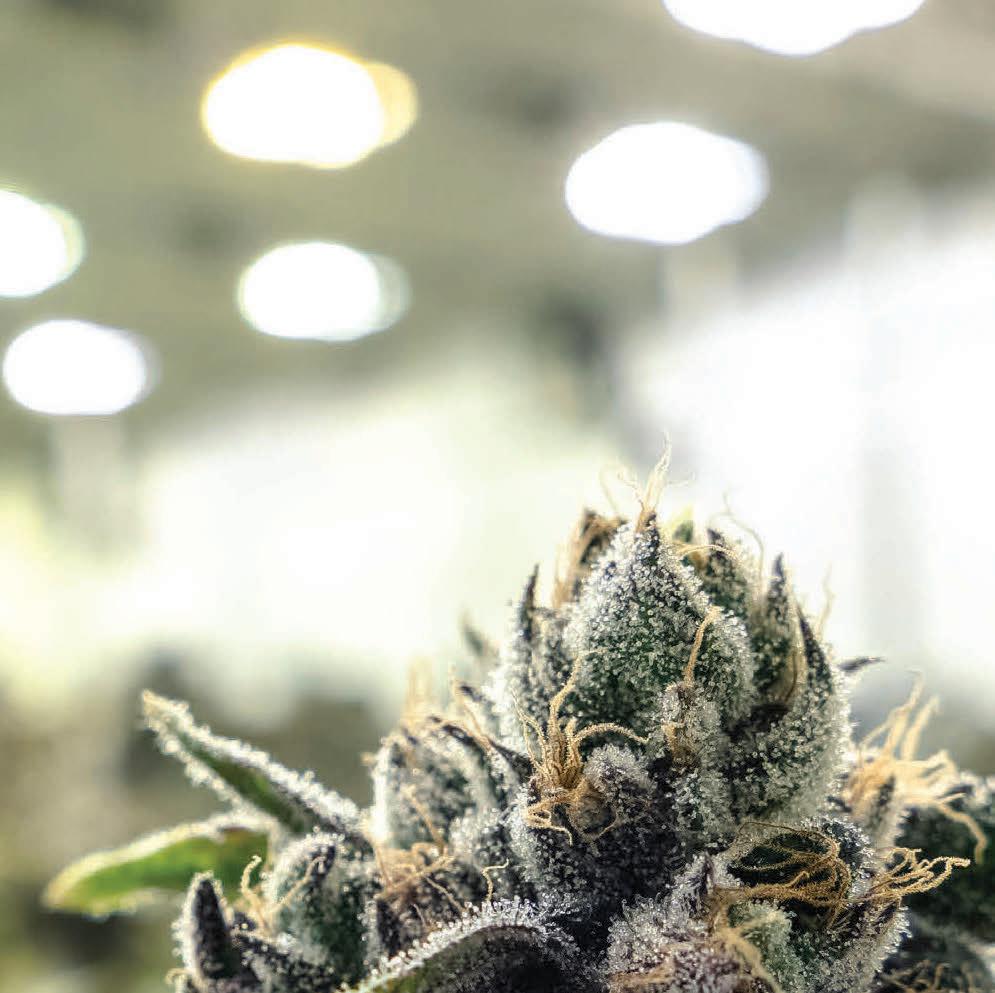




Michigan’s cannabis market is evolving fast — we help you stay ahead. Oversupply. Shrinking margins. Shifting regulations. In Michigan’s competitive cannabis landscape, success isn’t just about producing great product — it’s about running a smarter business.
At Maner Costerisan, we specialize in helping cultivators, processors, dispensaries, and vertically integrated operators navigate growth, restructuring, and compliance with confidence. As longtime members of the MiCIA, we understand Michigan’s unique market challenges — and how to turn them into opportunities.
Whether you’re preparing for expansion, considering a sale, or trying to tighten operations, our team delivers:
• CFO-level guidance for multi-entity structures
• Accounting Techology and Integration with seed-to-sale and other operational software
• Cash flow forecasting and margin analysis to improve profitability
• FASB-compliant lease accounting and real-time reporting
• Support with audits
We don’t just help you grow — we help you grow wisely.


How the 24% wholesale tax came to be and what comes next
By Kevin A. McKinney
In the more than four decades I have worked in Michigan’s legislative and political arena, I have never experienced such an acrimonious and nontransparent state budget process. This eightmonth budget stalemate was contentious due to the immediate revenue decline the state was facing from the federal One Big Beautiful Bill Act and due to the House Republicans’ priority to tie the road funding initiative to the state budget. Then, add in Gov. Gretchen Whitmer’s unfulfilled promise since 2018 to “fix the damn roads.” Vastly different spending plans adopted by each chamber quickly amplified the stalemate and hyperpartisanship leading right up to the end of September, threatening a government shutdown.
The governor’s call for a robust and sustainable local road funding proposal casually mentioned a 32% wholesale tax on cannabis, which no legislative leaders from either chamber expressed publicly, nor privately, interest in implementing. The MiCIA was quick to communicate to all leaders its strong opposition to such a proposal. The House passed a $3.2 billion road funding proposal, leaving about $2 billion to be funded by unspecified new revenue. House Speaker Matt Hall’s insistence that road funding be tied to the fiscal year 2025–26 budget became a nonnegotiable issue with the Senate, and his expressed willingness to shut down state government unless a road funding package was included raised the political stakes and brinkmanship. Once the budget deal between the legislative leaders
and the governor was made in the last few days in September, which included road funding with a 24% wholesale tax on cannabis as a key revenue source, the leaders held to the agreement even when the Senate was short on votes to pass House Bill 4951 (the Comprehensive Road Funding Tax Act).
Prior to the July 1 statutory budget deadline, the MiCIA repeatedly expressed to the speaker’s office, governor’s policy staff, and Senate leadership its strong opposition to the wholesale tax but also its willingness to explore new revenue streams to avoid a new tax on existing transactions under the Michigan Regulation and Taxation of Marihuana Act. One possibility brought to the attention of the MiCIA was the untapped market for

Kevin A. McKinney
a low-THC hemp beverage that has done well in other states. Discussions began in earnest to find the correct regulatory framework for a safe and tested beverage processed by a licensed cannabis processor and then distributed through the Liquor Control Commission’s system. It would be a model for the nation; however, the Department of Treasury’s estimated tax revenue projections were low, not accounting for the export of the product. While still a new revenue, it would not generate the $420 million that was needed if a wholesale tax was to be avoided. House Democrats working in concert with the MiCIA prepared an alternative lower tax to the 32% wholesale tax, but it was never considered.
It is not hard to determine exactly how it went down in the four caucus meetings once the leadership and governor struck their budget and road funding deal. Unfortunately, the lively exchange of other options was muted by the leaders. The governor’s staff also applied significant pressure in the Democratic caucus’s meetings to support the tax, adding they were open to working with the cannabis community on some legislative reforms.
The procedural motion on the House floor to discharge H.B. 4951 from committee with no hearing, and then the substitution of the 24% wholesale tax and vote on the floor within an hour, was purposeful: to minimize opposition and to continue the narrative that it had to move to avoid the looming state government shutdown.

Being up against the Senate majority leader, the House speaker, and the governor, coupled with the backdrop of a threatened state government shutdown, constituted incredibly significant challenges to stop the passage of the wholesale tax. However, I am proud of the overall response from the cannabis community and the heroic effort by the MiCIA to coordinate the Lansing rally and final days of advocacy that went into the early hours of Oct. 3. The efforts had a great impact, evidenced by the fact that the governor was still two votes short on Friday, Oct. 3, and mustered the final two votes only after hours of pressure and
promises and in the face of the speaker stating he would let the government shut down if the tax was not adopted. A special note of thanks to Sen. Jeff Irwin, D-Ann Arbor, for championing the opposition in his caucus and across the aisle and to Sen. Jonathan Lindsey, RColdwater, for his efforts in the Republican caucus and his floor speech.
Even with the lawsuit filed by the MiCIA, which was an expected outcome of the passage of the tax, there is some urgency in both the House and Senate regulatory committees to begin work on MiCIA legislative priorities to stabilize the market and bring predictability by
removing various barriers to growth. Senate leadership has introduced two initial bills dealing with statewide caps on various licenses (Senate Bills 597 and 598) and a bill package to address the intoxicating hemp coming into our state that is unsafe, unregulated, and not age-gated (Senate Bills 599–602). At a recent hearing in the Senate Regulatory Affairs Committee, the MiCIA provided convincing data on the need for both packages; however, further refinement on the legislation is continuing with additional hearings scheduled.
The House Regulatory Reform Committee will begin work on H.B. 4963, which mandates cash on delivery — the requirement in the alcohol industry. However, there are ongoing discussions to reach a consensus to modify the language to make it more “workable” for the cannabis industry. Additionally, other bills will be introduced soon that will give the Cannabis Regulatory Agency additional tools to address violations.
Finally, I have stressed in every article I have written in this magazine the need to know your legislators. Local advocacy is no longer an option — it is a must. The need for sustained grassroots advocacy was most evident in witnessing cannabis advocates who came to the capital with passion and resolve but had never met their legislators before fail to convince them to buck their leader and governor and oppose the wholesale tax. I heard from only a few legislators who shared with me that their long-standing relationship with local cannabis businesses was their reason to oppose the tax. Now is the time to reset and quickly build those relationships with your policymakers. Additionally, you should also invest in your future by supporting your industry PAC (MiCIA State PAC). If you are not a current member of the MiCIA, join now and engage with cannabis colleagues to better leverage the industry to achieve legislative and regulatory successes.
Kevin A. McKinney is the lead lobbyist for the MiCIA.
Endo Propagation Manager Lucas Spencley points out the Adrian grow’s two-tiered system.
Built on genetics-first growing, Endo is making a name for itself in the crowded cannabis industry
BY WENSDY VON BUSKIRK
Endo Life Inc. made headlines this spring when one of its cannabis strains tested at 41% THC, a level long considered out of reach. Considering THC usually tops out around 30%, customers flocked to the Adrian dispensary to purchase the record-breaking flower, putting the cannabis company firmly on the Michigan map.



In addition to the Adrian dispensary (pictured below and to the right), Endo has two other retail locations and two cultivation facilities.
News articles and online skeptics questioned whether the claim was legitimate, but Endo Director of Cultivation Jason Herron insists the number — determined by Adrian-based North Coast Testing Laboratories of Michigan, which tested the cannabis three separate times, according to Herron — is accurate.
Endo President and CEO Don Lofton credits his company’s genetics program for producing high-potency strains. But he’s quick to point out that THC is just one measure of quality.
“What are the total cannabinoids, terpenes, and flavonoids? Those are the things that are going to give the taste, the aroma, and let the high last and linger,” Lofton says.
Still, the high-scoring Frogurt cultivar brought customers in droves, and proving doubters wrong has been part of Endo’s DNA since the company’s launch as a social equity business in the predominantly white town of Adrian.
Lofton grew up in Adrian and was a natural


entrepreneur from the start, launching his first business at 18 and running a variety of ventures in transportation and real estate. But when Michigan’s adult-use cannabis market opened, he watched out-of-town operators secure licenses before he did.
“The only conclusion I can see is because I’m Black,” he says. “I’m respected around here, so why are you preventing me from getting into this?”
When Endo finally opened its first retail store in March 2022, it was entering an already saturated local market.
“We were the 12th store to open up here,” Lofton says, adding that the dispensary quickly skyrocketed.
Last year, Lofton estimates, Endo brought in more than $19 million in revenue, and Lofton has aggressive plans for growth, including 10 retail locations in Michigan and 100,000 square feet of indoor canopy.
Lofton attributes much of Endo’s success to starting small, avoiding high-cost borrowing, and focusing on acquiring distressed assets for expansion. Lofton also avoids overinvesting in technology, a mistake he says many early market entrants made.

“Michigan has the best growers and products in the country. I’ve smoked all over, and Michigan growers do their thing.”
—Don Lofton, Endo
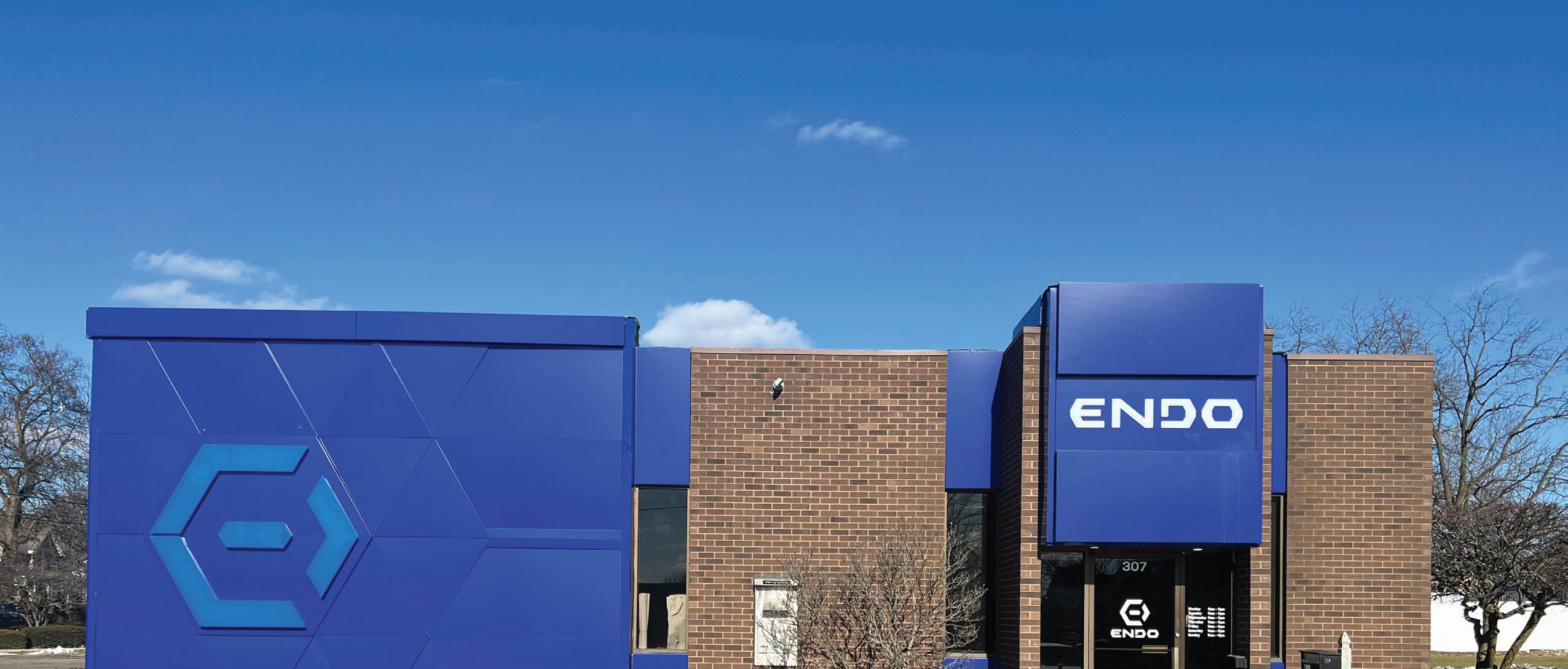






On a clear summer day, I make the drive to Adrian, passing through endless rows of cornfields that edge the winding country roads. Once inside the small college town, I pull into the dispensary parking lot and step into a modern retail space with Endo’s signature dark blue logo lending a sophisticated vibe.
I sign into the small shop where glass cases and racks are stocked with a riot of colorful products. Lofton comes out to greet me wearing an Endo baseball cap. He’s a busy man: His phone dings nonstop from his pocket as he launches into an overview of his vertically integrated business.
Endo now employs around 60 people and operates a second dispensary in Houghton Lake, which opened in April 2024, and a third in Ypsilanti near Eastern Michigan University that opened in September 2025. Another retail location is in the pipeline in Battle Creek. On the cultivation side, Endo runs two facilities in Adrian.
Lofton walks me along the wall of Endo products, pointing out how the branding has evolved. The company started with simple white packaging adorned with a curl of blue smoke but shifted toward vibrant graphic designs to meet customer expectations.
“When we came out, we said, ‘Let’s focus on what’s in the bag — the quality, how does it smoke?’” Lofton says.
From the beginning, Endo avoided what Lofton calls the “designer bag” trap, where flashy packaging oversells mediocre cannabis.
Endo’s standards, he insists, start with genetics.
“Genetics is probably 80% of it all,” he says. “We know if we have good genetics, then we’re going to be all right.”
The company also maintains a hand-trimming process, especially for large buds, to ensure consistent quality. Favorite strains include Gelato Cake, Black Cherry Gelato, and Death by Boof.

Head grower Herron brings extensive background from the legacy market and has been with Endo since the very beginning with the goal of “bringing the highest-quality flower to Michigan’s market,” Herron says.
That record-breaking 41% THC Frogurt strain didn’t happen by accident. It was the result of years of phenotype hunting, dialing in growing conditions, and sticking with proven genetics.
The team at Endo keeps up to 15 strains consistently testing at or above 30% THC and cycles through about 20 strains at any given time, always hunting for the next best thing.
“We pheno-hunt all the time, trying to find those gems,” Lofton says. “Once we get a wide library of what we consider quality, we’ll simmer down, but we’ll nev-
er stop. In this industry, everybody wants what’s next.”
Consistency, Lofton says, is key. That means making hard decisions, including cutting strains that don’t perform in the market, even if they’re personal favorites.
After we wrap up at the dispensary, we get into separate cars and I follow Lofton down the road to his cultivation facilities.
The first is a roughly 12,000-squarefoot warehouse he once used for his transportation business. The second, acquired in 2023, is a 25,000-square-foot grow purchased from a cannabis company that went out of business, a prime example of Lofton’s “distressed asset” expansion strategy.
Inside, rows of plants grow under energy-efficient LED lights in a two-tier system. Lofton is in the process of adding
2 more feet of canopy height to all of the rooms, which will allow the plants to stretch out and grow taller. By doing this, Lofton expects to produce 800 to 950 pounds per month from Endo’s two facilities.
Lofton is proud not only of his company’s success but also of the broader Michigan cannabis scene.

“Michigan has the best growers and products in the country,” he says. “I’ve smoked all over, and Michigan growers do their thing.”
He also sees Endo’s success as proof that resilient social equity operators can thrive despite the challenges of entering a
crowded, capitalintensive industry.
From fighting for his licenses to commanding premium wholesale prices, he says, Lofton has built Endo into a sought-after brand without compromising on his core philosophy: quality first, hype second.
Lofton admits he’s got big ambitions and a tendency to move fast, but his approach is grounded in the realities of the market.
“We are rapidly growing, but we’re trying to keep control,” he says. “They’ve got to put a tamer on me sometimes. I get excited and they have to be like, ‘Slow it down.’”
If history is any indication, Endo won’t be slowing down for long.
“We pheno-hunt all the time, trying to find those gems. Once we get a wide library of what we consider quality, we’ll simmer down, but we’ll never stop. In this industry, everybody wants what’s next.”
—Don Lofton, Endo






By Wensdy Von Buskirk


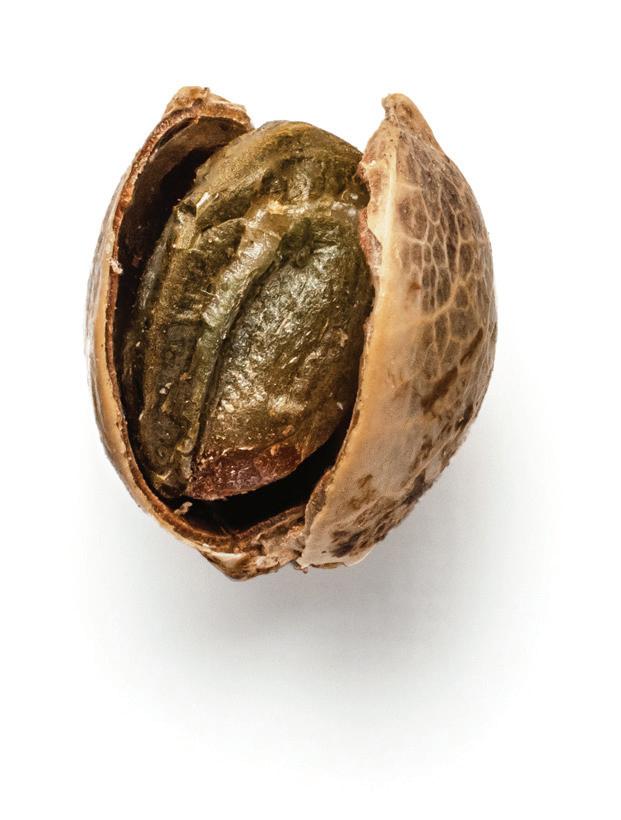
In a crowded cannabis market, few differentiators are more powerful than proprietary genetics. With Michigan’s maturing adult-use industry pushing operators to compete on quality, consistency, and name recognition, cultivators of a new class are standing out by creating their own.
Two such operators, Harbor Farmz and DogHouse, are striving to build brand legacies from the genetic level up. Through meticulous phenotype hunting and tight control over mother stock, they’re cultivating varieties entirely unique to their companies.
Other Michigan operators are looking outward, turning to specialized breeders such as Happy Valley in Massachusetts, one of several companies nationwide that ship cannabis seeds directly to licensed operators and home growers alike.
Harbor Farmz was an early mover in proprietary genetics in Michigan. Founded in 2017 and based in Kalamazoo, the company aims to “cultivat[e] the finest cannabis experience from farm to sofa.” Part of that mission is carried out in its tissue culture lab, led by Torél Beard, where a diverse genetic library is preserved and refined.
“Whether it’s from pheno-hunting, popping seeds, purchasing them from other people, or breeders who have actually reached out to us and given us genetics, they’ve come from all over the place,” says Ryan Messerschmidt, chief operating officer and director of cultivation.
The goal is to meet changing market demands.
“We’re looking for flavor, potency, smell, and bag appeal,” Messerschmidt says,

“and obviously, we’re in a production mode, so we want it to be able to yield and be able to make it profitable. Really, that’s what it boils down to.”
The company has already released more than 15 proprietary cultivars into the Michigan market. Each began as a seed and then underwent extensive refinement and validation over multiple harvest cycles before reaching consumers. A top seller is Willie’s Kush Cake, beloved for its flavor and potency.
Plant tissue culture, a modern propagation method, is key to Harbor Farmz’s process. Using nutrient-rich agar in sterile vessels helps eliminate pathogens and ensure genetic purity.
“We can take plant material from an old, worn-out mother plant and return clean, healthy, and genetically true
“It’s a copycat industry, and I feel like everybody needs to focus more on standing out, doing their own thing, and better quality.”
—Ryan Messerschmidt, Harbor Farmz
generation-zero clones,” the company notes on its website.
Harbor Farmz is looking to find unique gems.
“It’s a copycat industry, and I feel like everybody needs to focus more on standing out, doing their own thing, and better quality,” Messerschmidt says.
DogHouse takes an equally rigorous approach. Founded in Oregon in 2015, the company now operates on Detroit’s east side in a 25,000-square-foot cultivation facility with 10 grow rooms and dedicated research and development space. Its flower and pre-rolls are stocked in dispensaries across Michigan.
Head of cultivation Justin Van Fleet oversees plant care, irrigation, and strain selection — with flavor as the top priority. DogHouse sources genetics from trusted breeders and conducts pheno-hunts to create stable, distinctive strains. Many favorites begin with seeds from legacy suppliers such as Romulan Genetics and Offensive Selections.
DogHouse champions legacy “gassy, diesel, earthy” strains. The team believes that as the market matures, consumer tastes will shift back from fruity, citrusy strains toward these classics.
“It’s more of a slow burn, getting everybody hip to the older-school flavors and genetics,” Van Fleet says. “As people start to get educated, I think a lot more people are going to start to change their shopping and purchasing habits.”
A few releases include Gasface, Gratiot Gold, and Pink Passion. DogHouse lists genetic lineages for each offering on its website, underscoring its commitment to transparency.





For both Harbor Farmz and DogHouse, finding the next great strain requires patience, resources, and precision. Pheno-hunting means germinating large batches of seeds; monitoring and documenting each plant’s growth; and selecting for traits such as flavor, performance, and consistency.
Environmental factors from lighting to nutrient regimens play a major role in how plants express their genetics, which in turn affects consumers’ experience. For vertically integrated companies, proprietary strains create shelf appeal and brand differentiation in a saturated market.
Operators who own their genetics reduce risk, avoid dependency on clone suppliers, and develop products competitors can’t replicate. Harbor Farmz and DogHouse are building stable portfolios of unique genetics they can rely on for years.
While some Michigan operators create new varieties from scratch, others look out-ofstate for distinctive cultivars. One notable partner is Happy Valley, based in Gloucester, Massachusetts.
Dan Nelson, director of sales, says the company started out as a vertically integrated Massachusetts cannabis producer and evolved into a business with two retail locations, a 55,000-square-foot production facility, and a genetics arm.
“Over the past two years, since our entry into this space, we have brought 15 different varieties to market, both autoflower and photoperiod feminized seed, with another 40-plus on the horizon for the rest of this year and the beginning of 2026,” Nelson says.
Happy Valley ships nationally and inter-
nationally, leveraging the fact that it’s legal to ship seeds across borders because they contain 0% THC. Happy Valley collaborates with Ethos Genetics as well as Medicinal Genomics, whose founder, Kevin McKernan, was a pioneer of the Human Genome Project. McKernan uses genomic sequencing to identify potential crosses and create more-robust hybrids by finding plants with more genetic diversity.

Nelson likens breeding to his former career in restaurants.
“If you like one dish but you want to incorporate an element of another, you play around in the kitchen, and that’s literally what we do,” he says. “But we’re using marker-assisted breeding and an abundance of data to make informed decisions about what direction we would like to breed in.”
Happy Valley’s breeding program involves popping up to 50 seeds per cultivar and growing them out in-house to select top performers. These winners are then stabilized and made available to growers seeking new offerings. For Michigan brands seeking fresh genetics without starting from scratch, partnerships with companies like Happy Valley offer an attractive shortcut.
In Michigan’s current market, which is still contending with oversupply and consolidation, proprietary genetics provide a way forward rooted in craft, science, and longterm thinking.
Operators like Harbor Farmz and DogHouse are planting the seeds, literally, for the next generation of cannabis. Whether bred in-house or sourced from trusted partners, unique cultivars are fast becoming the backbone of brand identity.
And as consumers grow more discerning, these genetics may be the difference between blending in and standing out.







BY BECKY KALAJIAN





“In the cannabis industry, … you have to have a clear understanding of what your identity is. For us, [it’s] premium sun-grown flower.”
—Will Bowden, Grasshopper Farms
Regardless of risk, there are some cultivators that prefer old-school sun and rain to grow lights and sprinkler systems.
One in particular — Southwest Michigan’s Grasshopper Farms in Paw Paw — bets on Mother Nature despite mold risk, temperature fluctuations, and unpredictable finish times.
Success is dependent on the grower’s knowledge of the hyperlocal environment, says Will Bowden, CEO and founder of Grasshopper Farms.
“It’s not just the ZIP code; we’re talking that specific spot,” Bowden says. “You have to know how to work with your environment. You’re going to get different pests and pathogens in a 5-mile radius.”
The upside of going outdoors, say cultivators, is a more robust product without the costs associated with indoor grows.
In fact, Grasshopper Farms is all in when it comes to cannabis marketed as sungrown, sustainable, and local, says Bowden, a military veteran who launched the over 160-acre farm in 2020. Close to a quarter of that acreage is developed; Grasshopper Farms has about 6,100 plants and sells out of product every year, Bowden says.
Bowden maintains that exposure to environmental pressures such as wind, pests, and pathogens leads to better cannabis. “As the plant is bombarded with those things,” he explains, “it actually has a natural ability to try to defend itself, and it actually creates a more robust cannabinoid/terpene profile.”
Bowden wants to expand his operation to 10 states. In addition to Michigan, he is currently licensed and growing outdoors in Colorado. This year, he received his final licensure for a grow in New Jersey.
Bowden believes that the industry will eventually recognize the nuanced value of climate-driven cultivation but also says that it requires special attention and understanding.
“Climate really plays a factor into when you start your growth season and when you start your harvest,” he says. “You can’t plant outside when frost is still imminent, and you’ve got to harvest before frost is also imminent.”
Some grows are choosing to forgo outdoor cultivation altogether, says Robin Schneider, executive director of the Michigan Cannabis Industry Association.
“Some members decided not to plant this year for various reasons, including threat of mold and other typical outdoor-centric barriers,” she says. “We feel bad for them, but we’re cheering on the ones like Grasshopper that did decide to plant.”
Michigan is categorized by the United States Department of Agriculture into three distinct temperature zones: 4, 5, and 6.


Grasshopper Farms in the southwest Lower Peninsula is in Half-Zone 6a, where the coldest temperature every year averages from -10 degrees Fahrenheit to -5 degrees. On the other hand, many grows in the Upper Peninsula may fall in half-zones 5a or 5b, where the lowest winter temps annually average from -20 degrees to -10 degrees.
Given the varying temperatures, selecting cannabis strains for outdoor cultivation in Michigan demands experience and environmental adaptation.
And as testing is fine-tuned, Bowden says that specific terpenes and cannabinoids, including those best produced outdoors, will become more sought-after if the growers continue to align the strains with a compatible environment.

“That’s very important to say that out loud: Appropriate strains that are better suited for outdoors will produce stronger cannabinoid/terpene profiles based off of things like strong wind, different levels of sunshine, [and exposure to] some pests and pathogens,” he says.
Bowden, a native of California who is a proponent of sustainability, says that his fully outdoor grow in the southwestern corner of

Michigan’s Lower Peninsula thrives in the state’s climate.
Bowden’s grow season begins with cutting from mother plants between January and April. The healthiest plants are chosen, planted, and tended by hand through their only harvest in the fall, which lasts about five weeks, after which the team begins processing the flower.
“That process takes us all the way through, usually, the following February. … So we’re busy all year round,” he says. “It’s a lot of work. Oh my gosh, it’s so much.”
Despite the long hours, climate risks, and unpredictability of outdoor cultivation, growers like Bowden remain deeply committed to their method.
“In the cannabis industry, … you have to have a clear understanding of what your identity is,” Bowden says. “For us, [it’s] premium sun-grown flower.”

















By Patrick Dunn

In June, Michigan Rep. Mike McFall, DHazel Park, introduced House Bill 4686, which would decriminalize possession of psilocybin for adults with a post-traumatic stress disorder diagnosis. In 2022, prior to his election as state representative, McFall was among the Hazel Park City Council members who unanimously approved a resolution decriminalizing psychedelic plants and fungi in the city, making it the third Michigan city at the time to do so. We talked with him in July about his new bill, its prospects in the Legislature, and the legal future of psychedelics in Michigan.
This conversation has been edited for length and clarity.
WHAT BROUGHT THIS ISSUE OF DECRIMINALIZING PSILOCYBIN TO YOUR ATTENTION IN THE FIRST PLACE?
When I was on City Council in Hazel Park, we had a group that came to us, and one of the women was talking about how nothing else worked for her until she started microdosing because her postpartum depression was so bad. And she was telling us about how she didn’t even think she’d still be here without it because nothing else was working for her.
That was actually my first run-in with people that were microdosing, so then I started doing more research on it. There’s been a lot of push, even at the federal level, with some federal legislators pushing for more [psilocybin access for] PTSD in veterans. So that was where I got my start, learning more about it and the positive impacts that it could have.
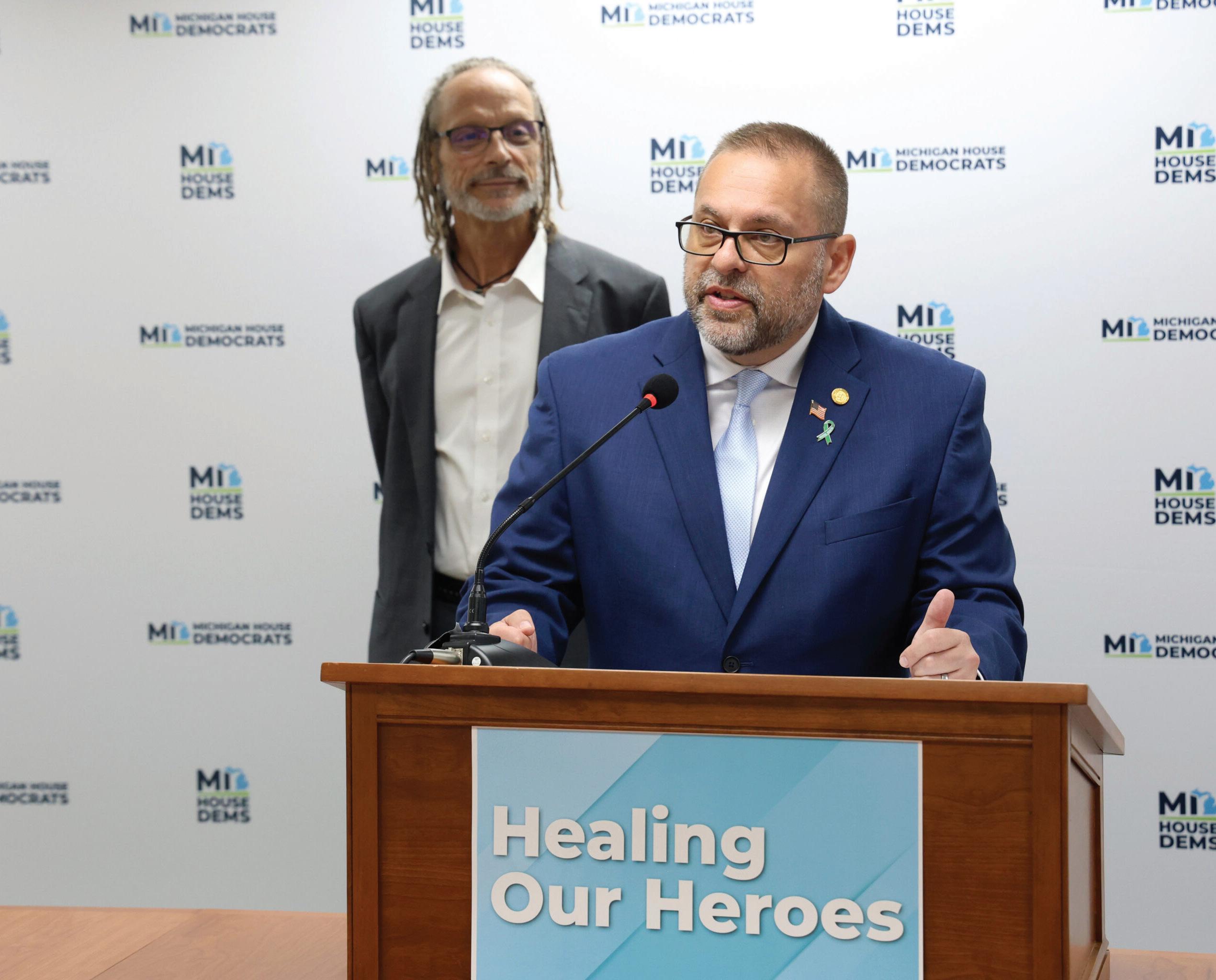
WHAT PROMPTED YOU TO INTRODUCE THIS BILL?
Much of the research on microdosing right now is around people with PTSD, and it is primarily around veterans. But we know that it works for veterans, and so it can work for a lot of others with PTSD. We have a lot of issues with homeless people and a lot of people that are self-medicating with drugs and alcohol, and we have people that are committing suicide because of struggles with PTSD. I decided to introduce it because we should be using every tool in our toolbox to help people with PTSD, because medications don’t always work for everybody, just like psilocybin won’t work for everybody. But we might as well make it so people have
access to it and are free from being arrested if it’s something that works for them.
HOW WOULD PEOPLE GO ABOUT GETTING ACCESS TO PSILOCYBIN UNDER YOUR BILL?
My bill does not focus on access to psilocybin. My bill focuses on pushing it down the list of things that police are looking for when it comes to penalizing someone. I didn’t want to try to bite off too big of a bite by trying to fully legalize. The problem is trying to get stuff like that across the finish line. It’s very difficult because the larger the thing you try to take on, the more people in opposition that come out of the woodwork. And it just makes it very diffi-
cult to get those types of things across the finish line. So I wanted to focus on where I thought the biggest need and the biggest help would be. And for me, that was PTSD.
WHAT HAVE YOU HEARD FROM YOUR CONSTITUENTS SINCE INTRODUCING THIS BILL?
I’m not only hearing from constituents, but I’ve gotten calls and messages from across the state. I had a call with a veteran from the west side who said that if I ever needed him to testify, he probably would do it. He even told me, “Our politics don’t line up, but I agree with you a hundred percent on that.” He’s a Republican, but this is something that cuts across party lines.
STATE SEN. JEFF IRWIN INTRODUCED A BILL IN 2021 TO DECRIMINALIZE ENTHEOGENIC PLANTS AND FUNGI, BUT IT DIDN’T ADVANCE OUT OF THE SENATE. DO YOU HAVE HIGHER HOPES FOR YOUR BILL, GIVEN THAT IT’S MUCH MORE SPECIFIC ABOUT WHICH SUBSTANCE IT’S DECRIMINALIZING AND WHO MAY USE IT?
I do. The way that Lansing works, when things are very specific and not broad-reaching, sometimes you’ll find partners that you didn’t expect because it doesn’t do the full decriminalization. At some point, we probably will be there. I don’t know when that will be, but the more that you see legislation like mine, it opens the eyes of people who have no idea that these do have a medicinal use. I think once people start becoming more comfortable
with that, they will see the broader usage for it, and they will be more open to the broader usage for it. I don’t think we’re there yet, but I also think that that means that my bill has a better chance of moving.
DO YOU ANTICIPATE INTRODUCING ANY FURTHER LEGISLATION ON DECRIMINALIZING PSYCHEDELICS FOR OTHER SPECIFIC MEDICAL USES?
Not at this time. I haven’t explored anything. I wanted to put all my efforts into this before I try to do anything else.
WHAT IS THE BILL’S STATUS NOW?
Right now, we’re in the middle of budget, so there’s not a lot of movement with other pieces of legislation. All focus is on that. So the bill has been sent to a committee, and I don’t see it being taken up any time before the fall.
IS THERE ANYTHING ELSE YOU’D LIKE TO ADD ON THIS TOPIC?
[Michael G. Smith, who spoke at McFall’s press conference announcing H.B. 4686,] is a military veteran. And he was talking about how life-changing [psilocybin] was for him. His PTSD was so bad. He would go into a room and the first thing he would think about was “How do I get out of here, and what can I use as a weapon to get out of here?” And he said once he started microdosing, those thoughts started going away. And he said that after he started microdosing, that was the first time he started to sleep through the night. So this is something that is literally life-changing and lifesaving. We should be doing everything we can to make sure that people have access to these types of things.

“This is something that cuts across party lines.”
Keep your workforce up to date with continuing education courses or degree programs. Become a partner to upskill your workforce, train new employees, request student interns, or fill open positions.
Programs include:
Cannabis
Human Resources
Business
Hospitality
Supply
To become a partner and search programs visit CE.baker.edu



































Recruiting Handled







Employee



















Trained
By Lance Boldrey and John Fraser
Capitalism dictates that not every business succeeds. This “truth” is almost as immutable as death and taxes. The reality of a business failure is often incredibly emotional. The business’s founders took a leap of faith to try to build a business, provide a livelihood for their families and the families of their employees, and create their American dream. Unfortunately, that dream has become a nightmare for many cannabis industry investors, owners, and employees. In open-license states such as Michigan, cannabis businesses are experiencing not just the contraction that is inevitable at the current stage of a market’s life cycle but also intense competition from the illicit market and licensees who intentionally violate regulations. Not a week goes by (sometimes not even a day) without our hearing from clients who are quitting the industry and seeking assistance to wind up their businesses.
In any business failure, there are often complicated questions about what to do next. It may be that a restructuring — either formally through bankruptcy or informally outside of that process — makes sense to salvage certain core aspects of the business. It may make sense to wind down the business informally and close up shop, or an organized liquidation of the business’s assets through bankruptcy to pay creditors and discharge debts may be preferable. The core purpose of the Bankruptcy Code is to help people and businesses that can no longer pay their debts get a fresh start. As a society, we’ve long understood that bankruptcy is a tool to help ensure that assets in the economy can be productively redeployed. The stakeholders in the business have a chance at a fresh start to make better and more productive use of their time and resources. The assets of the business can be acquired by a new operator who may be able to put those assets to more productive use in a new venture. These con-
cepts are not new; they have been tried and tested for nearly 500 years.
The conflict between state and federal law makes cannabis business failures significantly more complicated. Bankruptcy is a process governed by federal law and is typically unavailable for cannabis businesses. As a result, cannabis businesses have fewer “tools” to navigate insolvency than other businesses. Creditor composition agreements and receiverships can be good options to explore depending on the circumstances and the nature, source, and amount of the debt. There have been a number of fairly well-publicized cannabis receiverships in recent years, but receiverships are typically a tool used by creditors — and they can be extremely expensive. In addition, creditor composition agreements are best suited for instances where there is only one or a small handful of creditors. As a result, there is a glaring need for cannabis businesses (and their owners) that are facing solvency issues to explore other options to get a fresh start. In our opinion, a statutory assignment for the benefit of creditors may provide such an option for a number of financially distressed businesses.
An assignment for the benefit of creditors (or ABC, for short) is a process determined by state law. Of course, the law from one state to another can be quite different; in some states, ABCs are part of a court process, and in others, they are governed by statute. Michigan ABCs are statutory and involve a court process in which the debtor enters into an agreement with an assignee, assigning the debtor’s property to the assignee. See MCL 600.5201. The ABC creates a means for transferring the debtor entity’s assets to a trust or third party that
acts as a trustee over the assets. After the assigned assets are received, the assignment agreement is filed in state circuit court, and the assignee is then obligated to inventory and value the assets. The assignee must oversee the sale of these assets and distribute the proceeds from the transferred assets. The assignee has a duty to pay as much of the assignor’s debts as possible from the assets after the property is sold at a public or private sale. Michigan law designates the assignee as the “trustee of the estate of the debtor.” MCL 600.5205. Additionally, Michigan’s adult-use and medical marijuana statutes expressly permit a “court-appointed receiver or trustee” to operate a marijuana business. MCL 333.27959a(1)(b); MCL 333.27206a(1)(b). Since the assignee is a court-appointed trustee, Michigan law permits the assignee to take over the licensed operations of the marijuana business without the sometimes-lengthy requirement of obtaining approval of an ownership amendment from state cannabis regulators — much in the same fashion as a receiver is court-appointed and courtapproved. The Michigan Cannabis Regulatory Agency has a Notification of CourtAppointed Representative form that must be filed with the agency by the assignee upon court appointment. The assignee can thus quickly gain control and enjoy flexibility in maximizing the liquidation of the assets to pay creditors — for example, by continuing to operate the business as a going concern to maximize the business value. The ABC process could also provide unique opportunities if the assignee is serving multiple different distressed cannabis businesses, as it could create an opportunity to separate or bundle assets to make the business (or businesses) more financially attractive to prospective purchasers.
If the business has accumulated so much debt that operating cash flow will never permit the business to meaningfully service or clear that debt, an ABC can provide a lifeline. Owners of insolvent or financially precarious cannabis businesses may feel trapped, especially if they’ve personally guaranteed substantial debts of the business.
In any other business, a bankruptcy would be the typical remedy to address these situations. The business and its owners would typically walk away from the failed business without any continuing liabilities. Their losses would be capped at what they had put into the business.
Although bankruptcy is not an option for cannabis businesses, an ABC can provide many of the same benefits. Under an ABC, the business would not have any further continuing liabilities. While the ABC would not discharge any personal guarantees made
by the owners or stakeholders to guarantee any business debts, those individuals may be able to pursue an individual Chapter 7 bankruptcy to discharge those debts. There have been a number of cases from bankruptcy courts around the country that have seemed to endorse this strategy by permitting individual bankruptcy cases to move forward once the debtor’s bankruptcy estate no longer consists of any cannabis assets. Whether an ABC followed by an individual bankruptcy is a viable option requires careful discussion with legal counsel.
It’s no secret that many cannabis businesses in Michigan are struggling financially and that there are many “zombie businesses” out there. While not a perfect substitute for bankruptcy, an assignment for the benefit of creditors is an option that financially distressed cannabis businesses should discuss with their legal counsel. An ABC may be the most practical way to
effectuate an orderly windup of the affairs of the business and give the stakeholders an opportunity for a fresh start.

Lance Boldrey is a member and leader of the Cannabis Industry Group at Dykema, guiding clients — from small retailers to large, vertically integrated companies, as well as lenders and investors — through the evolving legal and regulatory landscape of the cannabis industry.

John Fraser is a member and Michigan team leader of Dykema’s cannabis practice, providing regulatory guidance to help cannabis businesses secure and maintain licensure.

Protecting a business in such a tightly regulated industry can be tricky. Here’s what you need to know.
By Patrick Dunn

Insuring a cannabis business can be complicated, especially given legal issues associated with the industry and the general complexity of cannabis operations. But there are still steps you can take to protect your business. We talked to Amanda Kugler, insurance agent at The Roots Insurance in Troy, who shared the following eight tips for navigating cannabis business insurance.
Because cannabis is still illegal at the federal level, Kugler says the industry is “high-risk in the eyes of most insurance companies.” Many won’t write insurance for cannabis businesses at all, and even cannabis-friendly insurers typically offer coverage with a long list of caveats. Kugler says licensees must be prepared for this challenging reality when they seek insurance.
“Cannabis businesses are put in a position where they’re not getting as much coverage, or if they are getting the same coverage as a standard business, they’re paying more premium for it,” she says.
In addition, she says, many insurers have exclusions for firearm, animal, and other specialized types of coverage for cannabis businesses.
Insurance requirements vary from state to state and from municipality to municipality. Especially for licensees with operations in multiple states, Kugler says it’s important to stay on top of varying regulations. At the state level, Michigan’s Cannabis Regulatory Agency requires licensees, depending on the license type, to maintain general liability, product liability, and marijuana liability coverage. But in addition to that, Kugler notes that some Michigan cities require licensees to obtain bond coverage, while others may require higher limits for some of the same coverages the CRA mandates. Landlords also often have their own insurance requirements.
“It is really important that [licensees] are in compliance with the regulations, just so they can maintain their license with the CRA,” Kugler says.
TO AVOID COVERAGE GAPS.
“It’s really important that the insureds understand what they’re buying,” Kugler says, noting that standard insurance policy wording “does exclude some key exposures” for licensees. For example, base policies usually have consumption exclusions, meaning that the licensee would need to get a special policy to cover cannabis consumption if they’re holding a special event on their premises. Similarly, some insurers require central station fire alarms. If a fire breaks out and the insured does not have such an alarm, their claim may not be paid.
“Understanding what is expected of you as an insured is vital to making sure that there’s insurance coverage in place,” Kugler says. “Insurance policies are not fun to read, and a lot of times the language doesn’t necessarily make sense or make it easy to read. But that’s why it’s important to work with an agent that really understands what they’re selling.”
4
MAKE CAREFUL DECISIONS WHEN INSURING YOUR CROP.
Kugler says “crop is difficult to insure,” as most base policies do not cover losses related to common problems such as mold, pests, overwatering, or failed lab testing.
“I just don’t think the insurance carriers want to come in and try to adjust those claims,” she says. “They’re going to be really difficult to adjust. They’re just being selective in the types of risks that they want to protect against, and they can be at this point in time because of the fact that [cannabis is] still federally illegal.”
Some licensees may pay a premium for additional coverage for their crop, although Kugler says such coverage is usually geared toward covering natural disasters, theft, and vandalism. Other licensees simply decide to self-insure for crop damage, setting aside money on their own to cover a potential loss. No matter which path you choose, Kugler says “truly
“Working with an agency that understands the different dynamics and different risks that are involved with operating a cannabis business is only going to help you as a company.”
Amanda Kugler, The Roots Insurance

understanding the losses that you’re protecting yourself from, and the costs associated with that, is really important.”
STAY ONE STEP AHEAD OF ANY WORKPLACE
Kugler notes that requirements vary from state to state, but Michigan requires anyone who has an employee to carry workers’ compensation insurance. Many licensees work with independent contractors, rather than employees, which exempts them from that requirement. But for those who do have employees, Kugler says, “you never want to be in a position where there is a workplace injury and there’s no coverage in place, because then you’re on the hook.” If an employee injury does happen, Kugler says, “it’s really important to work with the insurance companies the second an injury happens.”
“Even if it’s just a small cut on the finger, you don’t want to get to a point where you have a disgruntled employee who’s threatening to file a lawsuit because the injury wasn’t handled correctly,” she says.
6
BE PREPARED FOR YOUR PROPERTY INSURANCE NOT TO COVER EVERYTHING ON YOUR PROPERTY.
Kugler stresses that cannabis insurance policies are “à la carte,” and standard property insurance is “not going to be a blanket coverage covering everything in your building.” You must have separate insurance for the building itself, the equipment inside it, and the cannabis inside it at each stage of production. Kugler notes that cannabis plants, cannabis in the processing phase, and completed products all fall within distinct categories of insurance coverage. And if you want theft coverage for your property, you’ll need to work with your underwriter to ensure that you’re in compliance with their safe and vault requirements.
“Understanding what types of coverage you need, and making sure that that is specifically listed on the policy, is important,” Kugler says. “Without that, there would be no coverage.”
CARRIERS WHO SPECIALIZE IN CANNABIS AND UNDERSTAND THE REGULATORY LANDSCAPE.
“Not all insurance companies will cover cannabis businesses, and not all insurance agencies have the experience to insure cannabis businesses,” Kugler says. “So we just want to make sure that you are working with underwriters and insurance companies who know what it’s like to insure a cannabis business.”
Although Kugler says it’s less common now, she’s seen situations where licensees are paying for insurance from carriers that specifically exclude cannabis businesses.
“A lot of times, they probably just didn’t know what it was that they were insuring,” she says.
The smarter strategy, Kugler says, is to be “open and honest” with carriers who know the industry well.
“When you’re completing applications and when you’re talking to agents about your operations, you need to let them know exactly what you’re doing, because otherwise you could end up paying insur-
ance premiums and there not being any coverage in place,” she says.
PROFESSIONALISM TO INVESTORS, PARTNERS, AND REGULATORS BY COVERING YOUR INSURANCE BASES.
Kugler says that a comprehensive insurance package “shows that you are prepared, you are diligent in your management strategy, and ... you are a reliable business.” Lenders and investors often ask to see a business’s insurance package before initiating a relationship so that they know they’re protected if the business experiences a loss. Kugler says selfinsuring certain elements of your business can be a viable solution as long as you understand the risks you’re taking on. But she says not understanding those risks would be “concerning” for your business’s long-term future.
“Working with an agency that understands the different dynamics and different risks that are involved with operating a cannabis business,” she says, “is only going to help you as a company.”
“[Insurance carriers are] selective in the types of risks that they want to protect against, and they can be at this point in time because of the fact that [cannabis is] still federally illegal.”
Amanda Kugler, The Roots Insurance

By Paris Giles
Knowledge is key in any industry, but especially in the everevolving cannabis space. For those forward-thinking individuals and businesses who know this, the cannabis courses on offer at Baker College may be intriguing.
The nine-week courses, introduced in 2024, allow enrollees to work toward certification in any of three popular areas: cultivation, retail, and extraction and product development. The online courses aim to create well-rounded, passionate, and marketable individuals who are ready to enter the cannabis industry armed with a healthy knowledge.
“We partner with local dispensaries and growing organizations, and they have sent their employees through,” says Nathan Wright, Baker College’s assistant director of strategic partners and continuing education. “Then we also have people that are just graduating high school, and this is their first step, or adult learners that are coming back and wanting a second act in the cannabis industry.”
The $750 courses — which lean on a mix of lectures, readings, and interactive e-learning modules — start around the first week of each month and last nine weeks, but students have the flexibility to move at their own clip and finish early if they choose.
And while the courses themselves are 100% online, Wright notes that partnerships with local cannabis brands allow for hands-on learning and networking opportunities. He adds that because cannabis can’t cross state lines, a business that owns a grow facility, for instance, must operate it in the same state in which the company does business. In Michigan, a major player in cannabis, that means investing in a rich local infrastructure complete with skilled workers and potential entrepreneurs.
“No pun intended: It’s a growing field,” Wright says. “Making sure that we’re in part-
nership with the industry and up to date on what is happening is really important. I think it’s going to be more important that our population is educated, not only in the cannabis space but generally speaking. An educated workforce does better economically.”
Baker College’s cannabis courses are offered in partnership with Green Flower, based in Ventura, California. Founded in 2014, Green Flower creates cannabis training programs and educational materials for businesses, institutions of higher learning, and government agencies. As of this writing, Green Flower is collaborating with about 60 schools and universities.
“To have an industry that’s got that many people and that much volume and that much revenue and that much complexity, you need well-trained workers,” Simon says. “You need people who are educated and skilled and understand what they’re getting themselves into when they get involved in cannabis.”
Pontiac resident Kristopher Dorr recently enrolled in all three of Baker’s cannabis courses. He’s not formally connected to the industry yet, but he’s looking ahead, and he found the cultivation course especially useful. In particular, Dorr says he learned a lot about his region’s climate and how Michigan’s lakes can affect precipitation and therefore the ability to grow outdoors, as well as more on topics including “where to grow, your lighting, your nutrients — things of that nature.”
Dorr hopes to have his own cultivation operation in the future.



“We really take the time to deeply understand the industry, connect with the businesses, connect with the subject matter experts, and then build curriculums that are aligned with the exact needs and skills for the industry,” says Green Flower CEO and founder Max Simon. “We’ve spent a lot of time, a lot of energy, and a lot of money to build what has essentially become the industry standard for training people to be involved in different sectors of cannabis.”
“I gained enough knowledge to actually start and run any type of cultivation business,” he says. “I was able to download notes and videos, which made it easier to study.”
Cannabis in Michigan has become an oversaturated market with dispensaries struggling to stand out with consumers. One way for companies to differentiate themselves may be to invest in these certifications for their employees. Simon also acknowledges the cannabis industry’s unique turnover problem and says the courses available at Baker College and elsewhere can help to remedy that issue while strengthening the culture.

Green Flower and Baker College plan to add compliance and medicinal courses to the suite soon.
Simon notes that having skilled employees is especially important in a market like Michigan’s.
“Turnover is amazingly expensive and disruptive, and this industry seems to just decide that it’s OK,” Simon says. “The cannabis industry really could take a page out of many other industry playbooks that show educating and retaining your people is a competitive business advantage. … Having well-trained people becomes a company’s secret weapon.”







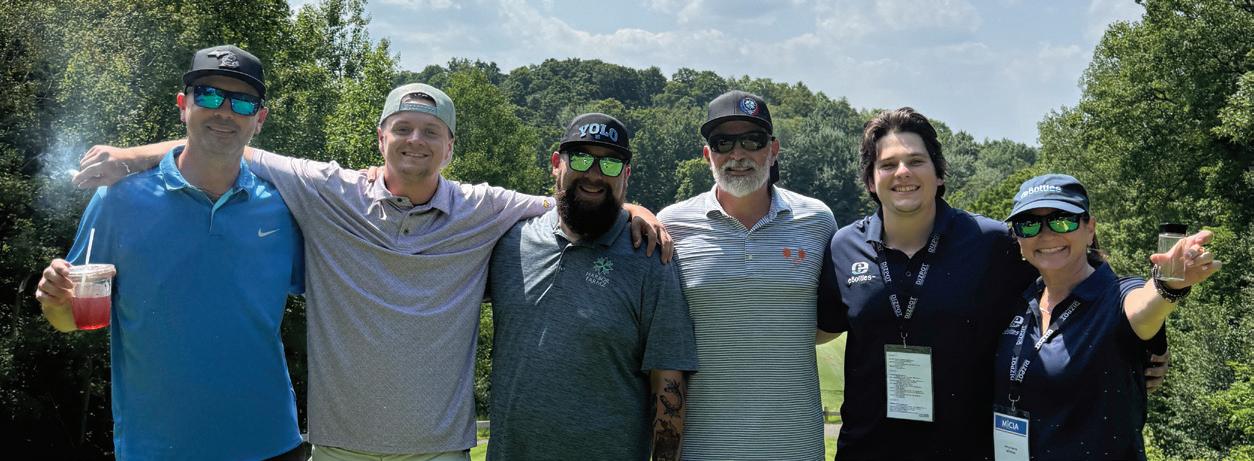
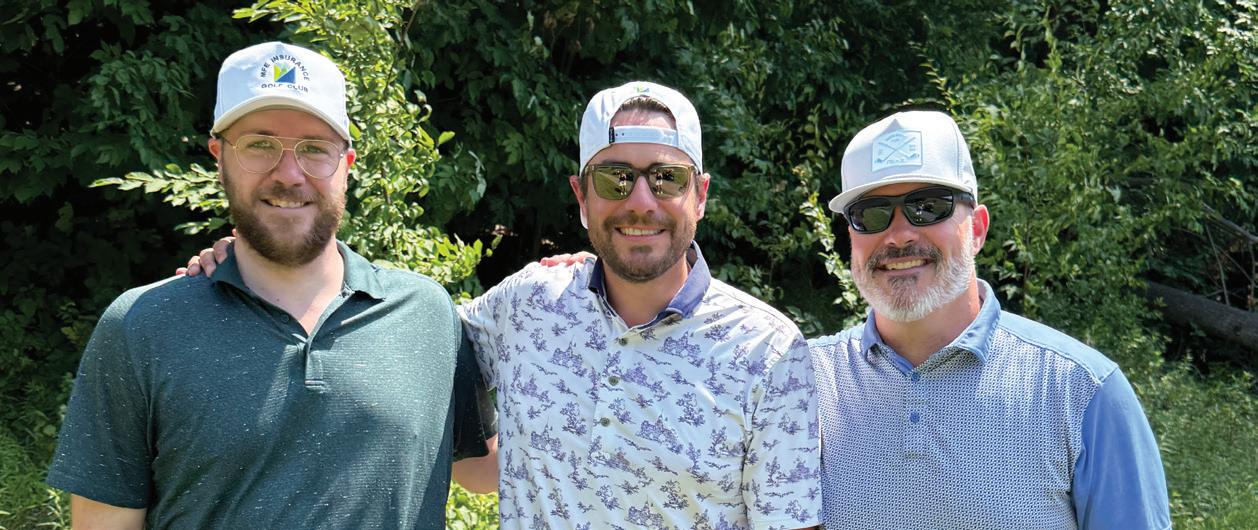


Take $500 off your first appointment with us. We’ll send an experienced crew to your facility to handle your harvest, bucking, trimming, or defoliating needs—no strings attached. Discover firsthand the quality, reliability, speed, and dedication that set us apart.
Contact us today and let’s discuss how our team can elevate your efficiency and profitability.
